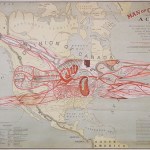physiology
Yes, years after I left the lab, I published a scientific paper. How did that happen?
Back in 2000, I published a paper on the way circadian clock controls the time of day when the eggs are laid in Japanese quail. Several years later, I wrote a blog post about that paper, trying to explain in lay terms what I did, why I did it, what I found, and how it fits into the broader context of this line of research. The paper was a physiology paper, and my blog post also focused on the physiological aspects of it.
But then, I wrote (back in March 2006 - eons ago in Web-time) an additional blog post…
Announcement of the 2009 Nobel Prize winners began Monday morning with the prize in Physiology or Medicine. The prize was shared between two American and one Australian-American researchers who identified a vital mechanism in genetic operations of cells--Elizabeth Blackburn, Carol Greider, and Jack Szostak. The trio was honored for their discovery of the protective relationship between telomeres and chromosomes, and the role of the enzyme telomerase. The Nobel Prizes in physics, chemistry, literature, and the Nobel Peace Prize will be announced later this week, while the economics award will…
tags: physiology, The Bloodmobile, They might be Giants, music video, streaming video
Here's another fun music video; "The Bloodmobile" by the creative group, They Might be Giants. This song tells about the many functions of blood, from providing oxygen to tissues to helping transport hormones (well, hormones are generally transported in the plasma).
Wow, the weight-loss topic is still going strong in the blogosphere (see that post for links for several initial posts).
Pal MD has more and some more.
Dr.Isis is on a roll.
Janet is now in the discussion.
Bikemonkey joins in.
Larry's had something related recently.
It is interesting to see how experts differ on the topic...and the comment threads are enlightening as well. Take-home message: don't trust a "TV dietitian"...or diet advice in your local newspaper or Cosmo....
As you know, my problem has always been the opposite. How to gain weight?!
The only time I managed to put on a few…
You may remember Dr.Charles whose blog was here on Scienceblogs.com for a while two years ago. He took a hiatus from blogging, but is now back at it with a vengeance at his new site which I warmly recommend you visit.
Today's post is interesting - and not just because it is partially about a PLoS ONE paper - Why Exercise is Not the Best Prescription for Weight Loss which fits perfectly within the ongoing discussion about weight-loss and dieting going on a couple of my SciBlings' blogs right now.
PalMD is going on a diet and monitoring his progress publicly, on his blog.
Dr.Isis tells him he…
Although I saw this obituary over the weekend, I didn't get to posting it until today. I was reminded by a local friend, an outstanding young scientist in her own right, of the impact that Dr Schanberg had made on so, so many lives in science, medicine, and our larger community.
I only had the honor of meeting Dr Schanberg once, shortly after his cancer diagnosis, while we were at a Duke Cancer Patient Support Center fundraising dinner. His wife of over 50 years, Rachel, is founder and former director of the organization which they started following the loss of their own daughter.
Among…
Another fabulously weird map, from the great blog Strange Maps. This one is entitled "The Man of Commerce" and dates to 1889.
According to the American Geographical Society Library,
The highly detailed 31" x 50" map/chart conflates human anatomy with the American transportation system, in an apparent attempt to promote Superior as a transportation hub.Its metaphor makes West Superior "the center of cardiac or heart circulation"; the railways become major arteries; and New York is "the umbilicus through which this man of commerce was developed."The explanatory notes conclude: "It is an…
After writing this post, I came across Alex's obituary and guestbook on Legacy.com. By all accounts, Alex was a great kid - loved and admired by many - an accomplished hockey player and musician with a love for the mountains. This could have been you or I, or worse, one of our own children.
Breaking my heart this morning is news from Boulder that last month's death of 20-year-old CU student, Alexander McGuiggan, was from consumption of "opium tea."
Police department spokeswoman Sarah Huntley said investigators believe McGuiggan and others had acquired poppy plants -- which are available…
Yup, it's tonight.
If you were around here a few months ago, the day after the Fall Back day, you probably read this post.
Disregarding the debate over rhetoric of science, that is probably my best, most detailed explanation for what happens to our bodies on those too strange days of the year - Spring Forward and Fall Back day.
Spring Forward is much more dangerous, so be very careful in the mornings next week, especially on Monday. Take it easy, get up slowly, be a little late for work if you can afford it. Life and health are more important than a few minutes of work and being punctual on…
Welcome 4 March readers of The Daily Grail - please be sure to also click on the original post about the DMT article by my colleague, Laura Mariani.
Thanks to Dave Munger & Co's ResearchBlogging.org, I just found a fabulous neuroscience grad student blogger from Emory University: Laura E Mariani at Neurotypical?
Doctor-to-be Mariani blogged last Monday about a paper in Science where the endogenous ligand of the orphan sigma-1 receptor was identified as the hallucinogen, N,N'-dimethyltryptamine, or DMT. The work originated with the group of Arnold Ruoho and colleagues at the University…
From SCONC:
Even if you haven't heard of Bisphenol A (BPA), you've likely been exposed to it. The endocrine disrupting compound is common in plastic infant bottles, water bottles, food cans and lots of other products. Scientists debate its dangers but the National Toxicology Program (based in RTP) acknowledges BPA as a source of "some concern" due to its possible harm to the brains and behavior of fetuses, infants and children.
On Wed. Feb. 18, at noon, come hear NCSU assistant biology professor Heather Patisaul share what she's finding about BPA's potential permanent effects in a talk…
Long-time readers of this blog remember that, some years ago, I did a nifty little study on the Influence of Light Cycle on Dominance Status and Aggression in Crayfish. The department has moved to a new building, the crayfish lab is gone, I am out of science, so chances of following up on that study are very low. And what we did was too small even for a Least Publishable Unit, so, in order to have the scientific community aware of our results, I posted them (with agreement from my co-authors) on my blog. So, although I myself am unlikely to continue studying the relationship between the…
So, the zoo nutritionists got together for a 2-day meeting at NCSU to discuss the issue:
Obesity among zoo animals is such a complex problem that zoo nutritionists, scientists and others, from as far away as England, gathered at N.C. State University on Friday for a two-day symposium on such weighty matters as how to tell when an oyster's weight is about right.
"It's actually a huge problem, and a multifaceted one," said Michael Stoskopf, a professor at the college. "You have to look at not only diets themselves and the amount of calories delivered, but also things like exercise."
The basic…
It's Thanksgiving tomorrow and the question (of the title of this post) pops up on the internets again. See SciCurious and Janet for the latest local offerings.
Short answer: we don't know.
But there is endless speculation about it, each taking into account bits and pieces of information that we know about tryptophan and related physiology. The hypotheses tend to focus on:
a) Tryptophan itself, i.e., how it can get from food, through the intestine, through the bloodstream, to the brain and what it would do once there.
b) Serotonin, as a product of tryptophan metabolism, and how it can be…
An Evolutionary Look at Sperm Holds Secrets of Mobility, Fertility:
The fusion of sperm and egg succeeds in mammals because the sperm cells hyperactivate as they swim into the increasingly alkaline female reproductive tract. One fast-moving sperm drives on through the egg's fertilization barrier.
Mammals have sperm with a tail that reacts when calcium ions enter a microscopic channel in the tail and make the sperm go into overdrive. In fact, four genes are needed to produce the so-called CatSper ion channel in the sperm tail that hypermotivates the sperm. The CatSper genes may someday be…
The 2008 Nobel Prize in Physiology or Medicine has been split between the discoverers of two viruses of major pathophysiological importance.
Half of the prize goes to German Dr prof Harald zur Hausen for his discovery of human papilloma virus as the cause of cervical cancer while the other half went to the French team that discovered human immunodeficiency virus (HIV), Françoise Barr´-Sinoussi and Luc Montagnier.
Just a few early thoughts: Notably absent from the award is American Robert Gallo, whose role in the HIV discovery has been long disputed. That this Nobel can only be awarded to a…
Apparently yes: Freshwater Farm Ponds Turning into Crab Farms:
North Carolina's native blue crab population has been at historic lows since 2000. Dr. Dave Eggleston, director of NC State's Center for Marine Sciences and Technology (CMAST) and professor of marine, earth and atmospheric sciences, looked at various methods for helping the population recover. He hit upon a solution which not only reduces pressure on existing crab populations, but also benefits farmers looking to diversify their crops: using irrigation ponds on farms to grow blue crabs.
----------------------------
Eggleston and…
Once a year, I go back to my alma mater and do a guest lecture about biological clocks in an Anatomy & Physiology class. Knowing how many pre-meds are among the 200 students in the room, I try to start with some examples of rhythms in human physiology (and disease), and the first one is body temperature, busting the myth that 98.6F (37C) is the "normal" temperature:
Now Orac links to an excellent post that explains it all - the entire history of the idea that 37C is normal and what the real difference, means and fluctuations there are. Read the whole thing.
tags: political views, politics, physiology, threat response, psychology, philosophyfight or flight, nature versus nurture
Most Americans have been actively engaged in the frustrating sport of arguing about politics, which often leads to the common refrain; "You just don't get it!" So this made me wonder why people who seem to have similar life experiences can end up with such dramatically different personal philosophies -- philosophies that ultimately affect their political views and voting behavior. Apparently, I am not the only one to wonder about such things, because a paper was just…


